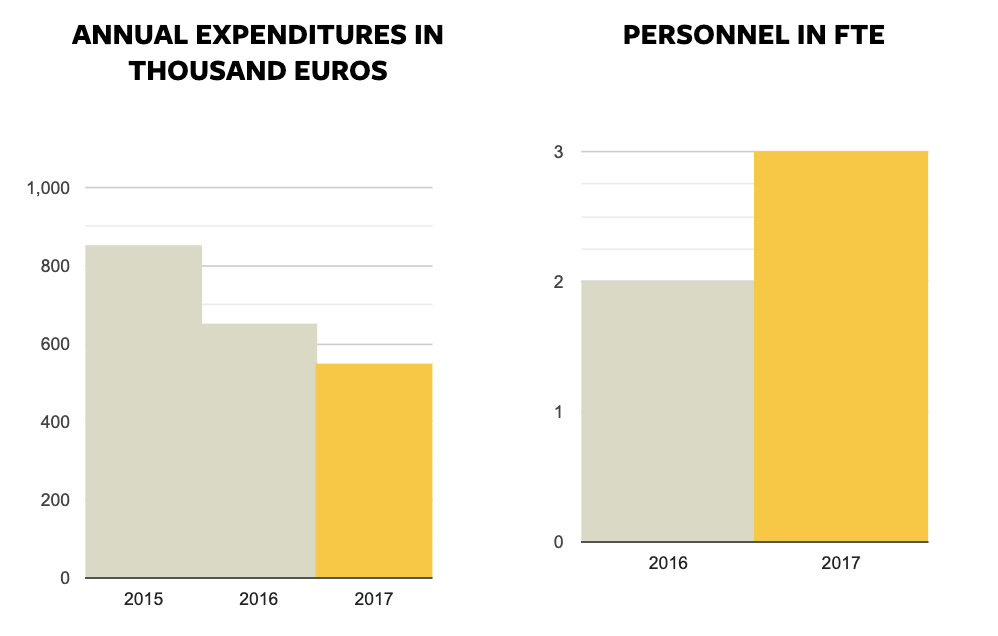Solidaridad North America continues to oversee the relationship with The Mastercard Foundation-funded MASO programme in Ghana, which trains rural youth to become cocoa farmers and entrepreneurs.

Solidaridad North America, together with Solidaridad China, concluded a three-year-long project in China that was supported by the Walmart Foundation, focused on training women cotton farmers in good agricultural practices, leadership, community building and entrepreneurial skills. Solidaridad also continued to engage with leading North American brands.

Phase three of a programme addressing deforestation among Indonesian oil palm farmers was finalized in cooperation with Solidaridad South & South-East Asia. This is supported by the David and Lucile Packard Foundation.

Together with Solidaridad in China and South America, Solidaridad North America concluded an agreement with The Nature Conservancy to address sustainability issues in supply chains across Brazil and China.

Solidaridad North America is supporting Solidaridad in India to implement a three-year project focused on training smallholder farmers in climate-smart agriculture practices. Supported by Pepsico, Mars and other partners, the project emphasizes water conservation, along with improving productivity and cane quality. Solidaridad experts were also actively engaged in addressing the prevention of Chronic Kidney Disease of Non-traditional Causes among sugarcane cutters in Central America.

DEVELOPMENTS
From climate change to human rights and immigration, 2017 presented numerous challenges that required organizations to take a position and respond. Despite the current United States administration’s unwillingness to support the Paris Climate Accord, several leaders from both the public and private sectors remained committed to climate action.
A number of extreme weather events also rocked the nation and this affected not just human lives, but also economics and business. As a result, the private sector has been increasingly focussed on science-based emission reduction goals, ambitious renewable energy targets and improving climate-risk disclosure. This is also in response to pressure from investors and consumers to be more transparent regarding sustainability risks and performance.
As the growing global population becomes more affluent, issues at the intersection of nutrition, health and climate change are increasingly critical. In particular, food and beverage companies continue to come under consumer and regulatory pressure to address food-related health and climate challenges. Simultaneously, there is rapid innovation in product development and farming practices, especially with the advancement of technologies such as artificial intelligence, big data and blockchain technologies. These trends are very encouraging and Solidaridad looks forward to building partnerships with players that are committed to enhancing agricultural sustainability.
ACHIEVEMENTS
Solidaridad North America engaged two multinational food companies in support of a three-year project in India to train smallholder sugarcane farmers in climate-smart agriculture. This project is supported by Pepsico and Mars and other partners, and is implemented in collaboration with two leading sugar mills. The project aims to reach 16,000 farmers.
Solidaridad continues to support the development of rural youth as cocoa farmers and entrepreneurs by managing the five-year MASO programme in Ghana. This programme, part of Mastercard Foundation’s Youth Forward Initiative, has already trained approximately 5,000 youth in agricultural, financial, business and life skills. Solidaridad participates in the steering committee of this initiative.
Solidaridad is also working with The Nature Conservancy in Brazil and China to address sustainability concerns along the soy supply chain between these two countries. This is supported by the Gordon and Betty Moore Foundation, as part of the Collaboration for Forests and Agriculture.
The second phase of a programme to address deforestation among smallholder palm oil farmers was concluded in West Kalimantan, Indonesia. Meanwhile, the commencement of the third phase of this programme was finalized and support from the David and Lucile Packard Foundation was secured.
A three-year project supported by the Walmart Foundation was concluded in China. This project focused on empowering female cotton farmers through training in good agricultural practices, leadership, community building and entrepeneurial skills. They also received training on the production of Better Cotton Initiative-certified cotton. This covered 19 project sites in the Hebei and Xinxuan provinces. A total of 4,699 metric tons of verified lint cotton was produced by smallholder cotton farmers in China, 44% of whom were women.

PARTNERSHIPS
Solidaridad continued to build relationships and partnerships with North American companies and philanthropic organizations across different sectors, including beverages, chocolate, textiles and soy. Solidaridad developed proposals for several US-based and international organizations addressing the sustainable production of commodities including palm oil, cocoa and aquaculture. Solidaridad also joined the Governing Committee of the Public-Private Alliance for Responsible Minerals Trade.
Solidaridad’s visibility in North America was enhanced by participating in various fora including workshops at the University of California, Berkeley and University of California, Davis. The team actively contributed to stakeholder dialogues led by Ceres to provide advisory recommendations to leading North American textile and apparel brands on their sustainability strategies. In addition, Solidaridad participated in numerous multi-stakeholder events including the UN Poverty and Environment Partnership, the UN Good Growth Partnership meetings, and the Principles for Responsible Management Education Conference. The Solidaridad North America team also contributed to internal strategy groups such as the Impact Investment and Gender Task Forces.
ORGANIZATION
A new finance and administration manager was appointed in North America. Solidaridad North America also assumed the role of interim International Programme Coordinator for the global cotton programme.
COMMUNICATION & CAMPAIGNING
Strengthening external communications and brand recognition was one of the key activities in 2017. Solidaridad developed several web stories and news items highlighting the projects being supported on the ground. Solidaridad also improved engagement through social media by setting up specific channels for North American supporters of sustainable supply chains.
